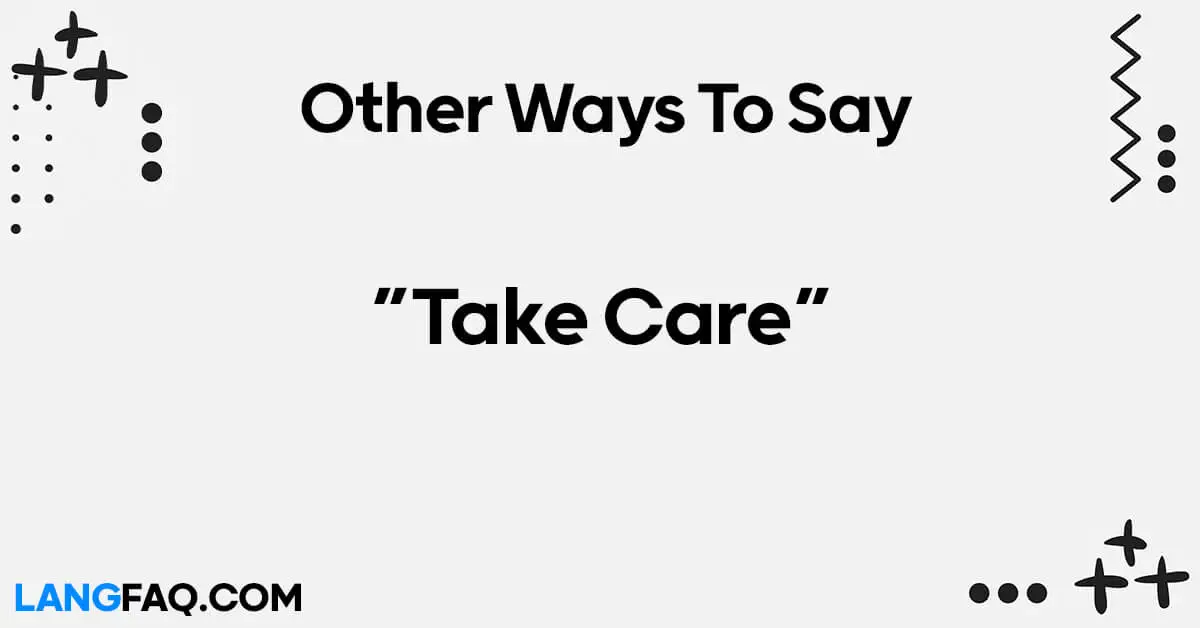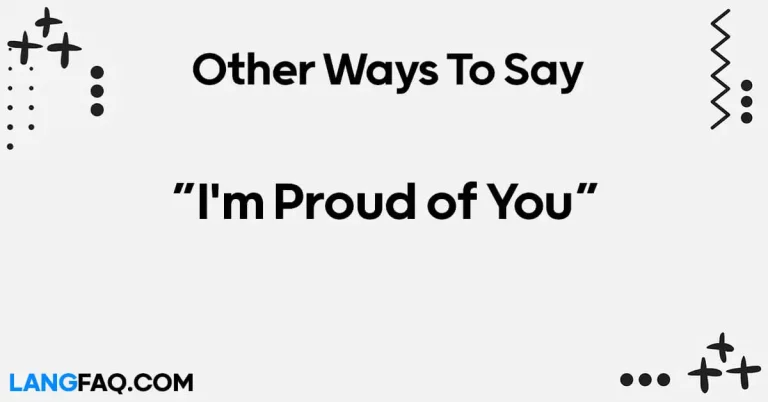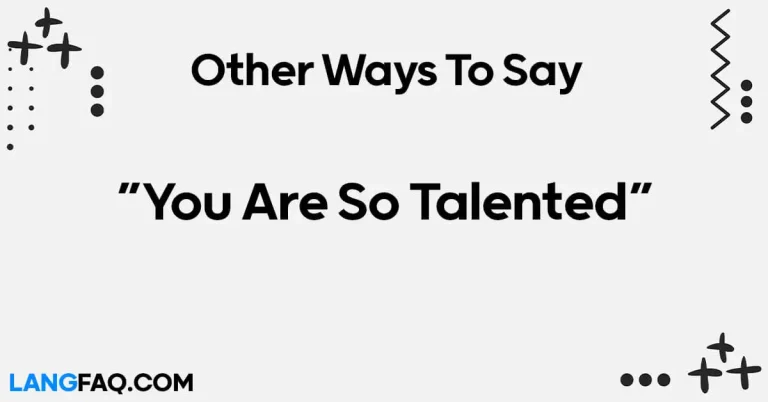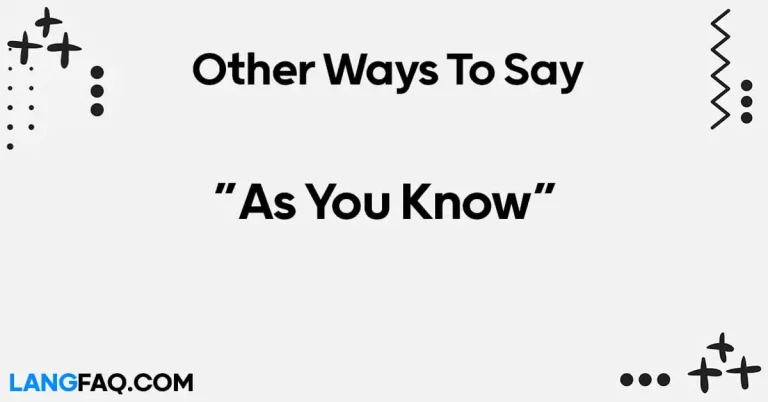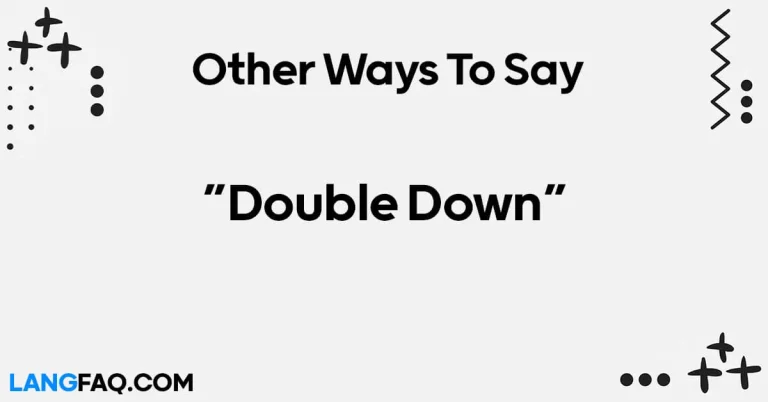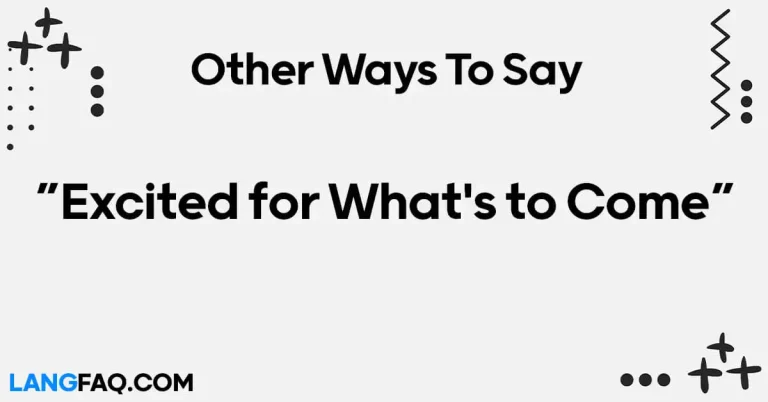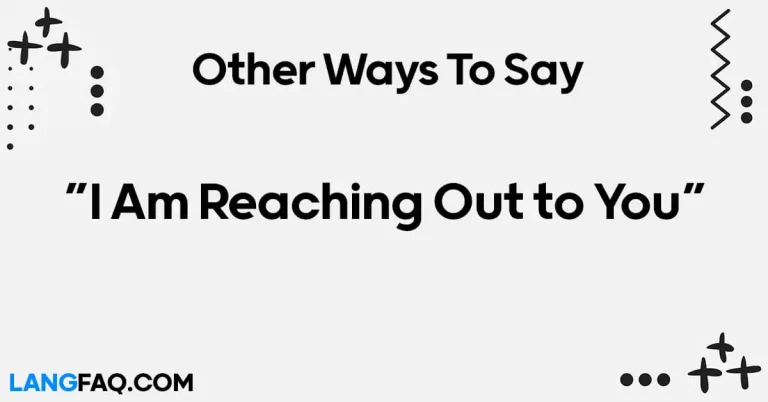Welcome to a world where caring goes beyond the ordinary. In this guide, we delve into 12 other ways to say “Take Care,” exploring the richness of language, cultural diversity, and the nuances of expression. Whether you’re bidding farewell or expressing concern, this article promises to elevate your verbal interactions to new heights.
12 Other Ways to Say “Take Care”
Here are 12 other ways to say “Take Care”:
- Farewell, Stay Safe
- Until We Meet Again
- Keep Yourself Well
- Safe Travels
- Be Well
- Look After Yourself
- Mind Your Health
- Take Good Care
- Stay Healthy
- Godspeed
- Till Next Time
- Adieu, Be Safe
Here’s a table with meanings and examples for the 12 other ways to say “Take Care”:
| Expression | Meaning | Example |
|---|---|---|
| Farewell, Stay Safe | Wishing someone safety and well-being | “As you embark on your journey, farewell. Stay safe and take care.” |
| Until We Meet Again | Expressing hope for future reunions | “This is not goodbye, but until we meet again. Take care in the meantime.” |
| Keep Yourself Well | Encouraging overall wellness | “Remember to prioritize your health. Keep yourself well, my friend.” |
| Safe Travels | Wishing a safe journey | “Bon voyage! Safe travels, and take care on your adventure.” |
| Be Well | Hoping for good health and happiness | “Take care of yourself, and be well in both body and spirit.” |
| Look After Yourself | Encouraging self-care and attention | “In my absence, remember to look after yourself. Take care, my dear.” |
| Mind Your Health | Reminding someone to prioritize health | “Don’t forget to mind your health. Take care and stay well.” |
| Take Good Care | Expressing a heartfelt wish for care | “Take good care of yourself; your well-being is important to us.” |
| Stay Healthy | Encouraging continued health | “Wishing you all the best. Stay healthy and take care of yourself.” |
| Godspeed | Wishing someone success and safety | “May your journey be filled with success and Godspeed. Take care along the way.” |
| Till Next Time | Indicating a temporary farewell | “Till next time, take care and stay in touch.” |
| Adieu, Be Safe | A formal way of saying goodbye safely | “Adieu, my friend. Be safe on your endeavors, and take care of yourself.” |
These alternatives offer diverse ways to express care and concern for others. Whether bidding farewell, wishing for safety, or encouraging well-being, these phrases add a personal touch to goodbyes, making them more meaningful and heartfelt.
Is It Correct to Say “Take Care”?
Absolutely, saying “Take Care” is a common and polite way to express concern for someone’s well-being. It is considered a thoughtful farewell that conveys a genuine wish for the other person’s safety and health. The phrase is versatile and can be used in various contexts, both formal and informal.
When and Where to Use:
- Informal Settings: It’s commonly used among friends, family members, and acquaintances when parting ways.
- Professional Environments: It is appropriate in workplace settings, especially when bidding farewell to colleagues, clients, or associates.
- Casual Conversations: Whether in person, over the phone, or in written communication, “Take Care” fits seamlessly into everyday conversations.
Pros of Using “Take Care”:
- Universal Politeness: It is a universally accepted and polite way to wish someone well.
- Versatility: The phrase can be used in various situations without sounding overly formal or informal.
- Sincere Sentiment: “Take Care” carries a genuine and caring sentiment, expressing concern for the other person’s welfare.
Cons and Considerations:
- Common Usage: As a widely used phrase, it might seem routine in some situations. Using alternative expressions can add a more personal touch.
- Formality: While suitable for professional settings, in more formal situations, like business emails or farewell speeches, a slightly more elaborate expression may be preferred.
Grammar and Usage:
- The phrase is grammatically correct and can be used as a standalone expression or as part of a sentence.
- It’s versatile enough to be adapted for different relationships and contexts.
Example Sentences:
- Informal: “Alright, I’ll see you later. Take care!”
- Professional: “Thank you for your hard work on this project. Take care, and we look forward to future collaborations.”
Variations for Different Relationships:
- Colleagues: “Take care, and best of luck in your new role.”
- Friends: “Have a great trip! Take care and make lots of memories.”
- Family: “Drive safely. Take care, and we’ll see you soon.”
Professional Mail Example With “Take Care”
Subject: Appreciation and Best Wishes
Dear [Recipient’s Name],
I trust this email finds you well. As we navigate through the final stages of our collaborative project, I wanted to express my sincere gratitude for your dedication and hard work.
Your contributions have been invaluable, and it has been a pleasure working alongside someone of your caliber. As we part ways upon the completion of this project, I want to extend my heartfelt thanks and wish you continued success in all your future endeavors.
Take care and know that your professionalism and expertise have left a lasting impact. I look forward to the possibility of working together again in the future.
Best regards,
[Your Full Name] [Your Position] [Your Company] [Contact Information]
Farewell, Stay Safe
Saying goodbye doesn’t have to be mundane; it can be a heartfelt wish for safety and well-being. Farewell, Stay Safe combines the sentiments of parting with a genuine concern for the other person’s welfare.
Scenario: This phrase is versatile and can be used in both formal and informal settings. In a professional context, you might use it when bidding farewell to a colleague leaving for a business trip. Informally, it’s perfect for saying goodbye to a friend heading home after a visit.
Example Sentence: “Before you go, let me say farewell. Stay safe on your journey, and I look forward to our next meeting.”
Email Sample:
Subject: Safe Travels and Farewell
Dear [Recipient’s Name],
As you embark on your business trip, I wanted to bid you farewell and wish you safe travels. Your contributions have been invaluable, and we eagerly await your return. Take care and stay safe.
Best regards, [Your Name]
Until We Meet Again
When a simple “goodbye” feels inadequate, Until We Meet Again adds a touch of optimism, expressing hope for future reunions.
Scenario: This phrase works well in various contexts. In a formal setting, it can be used at the end of a professional relationship, conveying gratitude and leaving the door open for future collaborations. Informally, it’s ideal for friends parting ways, knowing they’ll cross paths again.
Example Sentence: “This might be goodbye for now, but it’s not farewell. Until we meet again, take care and stay in touch.”
Email Sample:
Subject: Temporary Farewell
Dear [Recipient’s Name],
I wanted to take a moment to express my gratitude for our collaboration. While our paths diverge for now, it’s not a permanent goodbye. Until we meet again, I wish you continued success and happiness.
Warm regards, [Your Name]
Keep Yourself Well
Wishing someone good health goes beyond the ordinary “Take Care.” Keep Yourself Well emphasizes the importance of overall wellness.
Scenario: This phrase is suitable for various relationships. In a professional context, you might use it when bidding farewell to a colleague facing a demanding project. On a personal level, it’s a caring way to express concern for a friend going through a challenging time.
Example Sentence: “During this busy period, remember to keep yourself well. Your health is the priority.”
Email Sample:
Subject: Wellness Wishes
Dear [Recipient’s Name],
As you navigate through this demanding project, I wanted to remind you to keep yourself well. Your dedication is admirable, but your health should always come first.
Take care, [Your Name]
Safe Travels
For those embarking on a journey, Safe Travels is a classic and genuine way to express well-wishes.
Scenario: In professional settings, you might use this phrase when bidding farewell to a colleague heading to a conference. On a personal note, it’s perfect for friends or family members going on vacations or business trips.
Example Sentence: “Bon voyage! Safe travels, and take care on your adventure.”
Email Sample:
Subject: Wishing You Safe Travels
Dear [Recipient’s Name],
As you set off on your business trip, I wanted to send my best wishes for safe travels. May your journey be smooth, and I look forward to hearing about your experiences upon your return.
Warm regards, [Your Name]
Be Well
“Be Well” is more than a casual farewell; it’s a sincere wish for the other person’s overall well-being.
Scenario: Use this phrase when parting ways in both professional and personal settings. It’s suitable for colleagues transitioning to new roles or friends facing life changes.
Example Sentence: “As you embark on this new chapter, be well in all aspects of your life.”
Email Sample:
Subject: Wishing You Wellness
Dear [Recipient’s Name],
Congratulations on your new role! As you embrace this change, I wanted to extend my best wishes for your well-being. Be well, and may success follow you in every endeavor.
Best regards, [Your Name]
Look After Yourself
Expressing concern goes beyond words, and Look After Yourself is a phrase that conveys care and genuine interest in the other person’s welfare.
Scenario: Use this phrase in both formal and informal settings. It’s suitable for professional farewells as well as personal situations where someone might need extra support.
Example Sentence: “During this transition, remember to look after yourself. Your health and happiness matter.”
Email Sample:
Subject: Take Care and Look After Yourself
Dear [Recipient’s Name],
As you step into this new role, take care and look after yourself. Your well-being is crucial, and I believe your journey will be filled with success.
Warm regards, [Your Name]
Mind Your Health
Emphasizing the importance of health, Mind Your Health is a caring phrase suitable for various situations.
Scenario: Use this phrase when bidding farewell to someone facing health challenges or transitions. It’s a considerate way to express empathy.
Example Sentence: “Amidst all the changes, don’t forget to mind your health. Take care, and prioritize your well-being.”
Email Sample:
Subject: Prioritizing Your Health
Dear [Recipient’s Name],
In times of change, it’s crucial to prioritize your health. Take care, and remember that your well-being is paramount. Wishing you strength and good health.
Best, [Your Name]
Take Good Care
“Take Good Care” is a classic and heartfelt way to express care and concern for someone’s well-being.
Scenario: This phrase is versatile and can be used in various settings. It’s appropriate for both professional and personal farewells, emphasizing a genuine wish for the other person’s welfare.
Example Sentence: “As you move forward, take good care of yourself. Your health and happiness are paramount.”
Email Sample:
Subject: Taking Good Care
Dear [Recipient’s Name],
Before you embark on this new journey, I wanted to remind you to take good care of yourself. Your well-being is essential, and I have no doubt you’ll excel in all your endeavors.
Warm regards, [Your Name]
Stay Healthy
A wish for continued health, Stay Healthy is a positive and caring alternative to the conventional “Take Care.”
Scenario: Use this phrase in various contexts, from professional farewells to personal relationships. It’s a versatile way to express goodwill and concern for someone’s ongoing well-being.
Example Sentence: “During this busy period, remember to stay healthy and prioritize self-care.”
Email Sample:
Subject: Wishing You Continued Health
Dear [Recipient’s Name],
As you navigate through your commitments, I wanted to send my best wishes for you to stay healthy. Your well-being matters, and I hope you find moments of rest and rejuvenation.
Best regards, [Your Name]
Godspeed
A classic expression of good wishes, Godspeed is a unique alternative that carries a sense of success and safety.
Scenario: Use this phrase in situations where you want to convey both success and safety. It’s suitable for professional farewells and personal journeys.
Example Sentence: “Embarking on this new venture, I wish you Godspeed. May your journey be filled with triumphs and safe passages.”
Email Sample:
Subject: Wishing You Godspeed
Dear [Recipient’s Name],
As you venture into this exciting opportunity, I wanted to extend my heartfelt wishes for Godspeed. May success and safety accompany you every step of the way.
Warm regards, [Your Name]
Till Next Time
When saying goodbye isn’t farewell, Till Next Time keeps the door open for future interactions.
Scenario: Use this phrase in both professional and personal contexts. It’s suitable for colleagues going on temporary assignments or friends parting ways with the certainty of reunion.
Example Sentence: “While this might be goodbye for now, it’s not a permanent farewell. Till next time, take care and stay connected.”
Email Sample:
Subject: Temporary Farewell
Dear [Recipient’s Name],
As you embark on this short-term assignment, I wanted to bid you farewell, but not a permanent one. Till next time, take care, and I look forward to your return.
Best, [Your Name]
Adieu, Be Safe
For a more formal farewell with a touch of elegance, Adieu, Be Safe combines sophistication with a genuine wish for safety.
Scenario: Use this phrase in formal settings, such as bidding farewell to a colleague leaving the company or in professional emails. It adds a polished touch to your well-wishes.
Example Sentence: “As you embark on this new chapter, adieu, and be safe in all your endeavors.”
Email Sample:
Subject: Formal Farewell
Dear [Recipient’s Name],
With sincere gratitude for your contributions, I bid you adieu as you move on to new endeavors. Be safe, and may success accompany you on your journey.
Warm regards, [Your Name]
FAQs
Q: Can I use these alternatives in both formal and informal settings? Absolutely! The beauty of these alternatives lies in their versatility. Whether in a professional email or a casual text, these expressions work well in various contexts.
Q: How do cultural differences influence the choice of phrases? Cultural nuances play a significant role. Understanding the cultural background of the person you’re communicating with helps you choose the most appropriate and respectful expression.
Q: Are emojis and GIFs suitable for professional communication? While they add a personal touch in informal settings, it’s advisable to keep their usage minimal in professional environments to maintain a polished image.
Q: Should I always add a personal touch to my goodbyes? Adding a personal touch is recommended, but the level of personalization depends on the relationship. Keep it professional in formal settings and let your personality shine in informal ones.
Q: How can I express care in difficult situations without sounding cliché? In challenging times, sincerity is key. Use heartfelt expressions and offer specific support rather than relying on generic phrases.
Q: Can I combine multiple alternatives in one message? Certainly! Mixing and matching alternatives can add a creative flair to your expressions, making them more memorable and impactful.
Conclusion
In a world where words hold immense power, expressing care through thoughtful phrases is an art. This guide has equipped you with 12 other ways to say “Take Care,” ensuring your goodbyes are not just words but meaningful expressions of genuine concern. Elevate your communication, connect on a deeper level, and spread positivity with every farewell.

